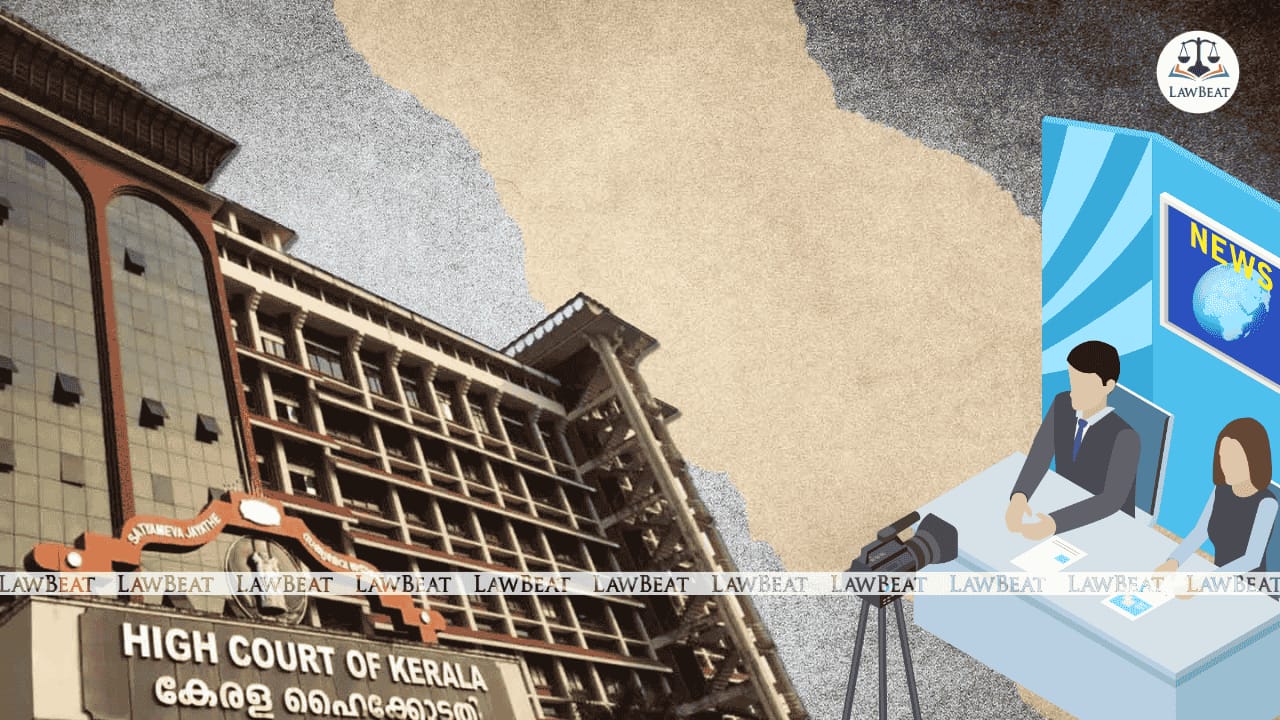Does Media Have Unrestricted Freedom in Reporting Pending Criminal Cases? : Kerala HC Answers

The court ruled that the right to freedom of speech and expression is not absolute and, when necessary, must be balanced against an individual's rights to life and personal liberty
The Kerala High Court, while addressing a significant question: “Whether the print and electronic media have unlimited and unrestricted freedom to publish details of criminal cases pending their investigation and trial?,” has clarified the limits on media reporting of pending criminal cases.
A five-judge bench comprising Justice A. K. Jayasankaran Nambiar, Justice Kauser Edappagath, Justice Mohammed Nias C. P., Justice C. S. Sudha, and Justice Syam Kumar V. M., ruled that while the media enjoys the right to freedom of speech and expression under Article 19(1)(a) of the Constitution, this right does not extend to expressing definitive opinions on the guilt or innocence of an accused before an adjudicatory authority has made a pronouncement.
“In the context of reporting facts relating to criminal investigations or cases pending adjudication before the various adjudicatory forums, the right of the media to freedom of speech and expression under Article 19(1)(a) would be further de-limited by their obligation to defer to the principle of separation of powers that is recognised under our Constitution. The said principle, coupled with the concept of rule of law, mandates that the final and authoritative determination of guilt or innocence can be pronounced only by a judicial authority. Therefore the expression by the media of any definitive opinion regarding the guilt or innocence of a party in a criminal investigation or a case pending adjudication, before an authoritative pronouncement is made by the adjudicatory forum concerned, would not get the protection under Article 19(1)(a) of the Constitution,” the court observed.
The bench also noted that while media freedom is fundamental to democracy, it must be balanced with the right to an individual’s reputation under Article 21 of the Constitution. “Human beings possess a special dignity and self-respect, which must be protected by the possession of rights. Such rights of individuals must always be taken into account,” the court said.
The judgment stemmed from a 2018 reference order and revisited the Sudhin v. Union of India (2015) decision, which affirmed the media’s right to report but noted it must align with reasonable restrictions under Article 19(2). The current writ petitions sought to curb media’s power to report on cases under adjudication, asserting that media should not pronounce on a party's innocence or guilt while a case is ongoing. The petitioners approached the court highlighting the rise of visual and electronic media engaging in unchecked discussions and speculative opinions on ongoing criminal investigations and court cases. These 'media trials,' they argued, create misleading narratives that interfere with justice and impede the right to a fair trial, damaging the reputation and dignity of those involved. The petitioners sought the establishment of guidelines to curb such media practices and called for restrictions on reporting courtroom proceedings and oral exchanges, limiting them to reflect only the court's written orders.The petitioners emphasised the need for responsible journalism, arguing that unchecked media expression could erode public trust in the judicial process.
The court noted : “the constitutional freedom of the press/media under Article 19(1)(a) of the Constitution extends in its scope and ambit to airing its personal opinion on what the result of a criminal investigation or an adjudicatory process would be by projecting it as a definite and inevitable outcome of the proceedings. This is more so because airing such opinions can also have the effect of violating the dignity/reputation of a party to the court proceedings which in turn are integral facets of his/her fundamental right under Article 21 of the Constitution of India.”
The court highlighted that the role of the media is that of a watchdog to disseminate truth to the knowledge of the public. It further noted that open justice is essential, with public access fostering transparency and trust in the judiciary, emphasising that Indian law upholds open court hearings, allowing media reporting to keep the public informed, supported by Section 327 of the Code of Criminal Procedure (Cr.P.C.), which mandates open trials, reinforcing the principle that justice must not only be done but must also be seen to be done. However, while Article 19(1)(a) of the Constitution protects freedom of speech and expression—critical for democracy and the functioning of a free press—this right is not without limits.
“While the freedom of speech and expression of the media, and the right to know of the people need to be protected and promoted, the right to a fair trial of the accused needs to be secured and guaranteed. The danger of "trial by media" replacing the rule of law with "rule by public opinion”. Media freedom is not a licence to interfere with the justice delivery system…Restrictions on media reporting during criminal trials are permissible to protect the integrity of the judicial process and the rights of the accused,” the court stated.
The court concluded that “the right under Article 19(1)(a) thus gets correspondingly delimited and, in appropriate cases, must yield to the right of the individual under Article 21 of the Constitution.” It further held that the media should avoid reporting on aspects of a case that could compromise the fairness of judicial proceedings, ensuring the integrity of the legal process and protecting the rights of all parties involved.
Cause Title: Dejo Kappan v. Deccan Herald & Connected Cases [W.P(C).NO.21108 OF 2014]
